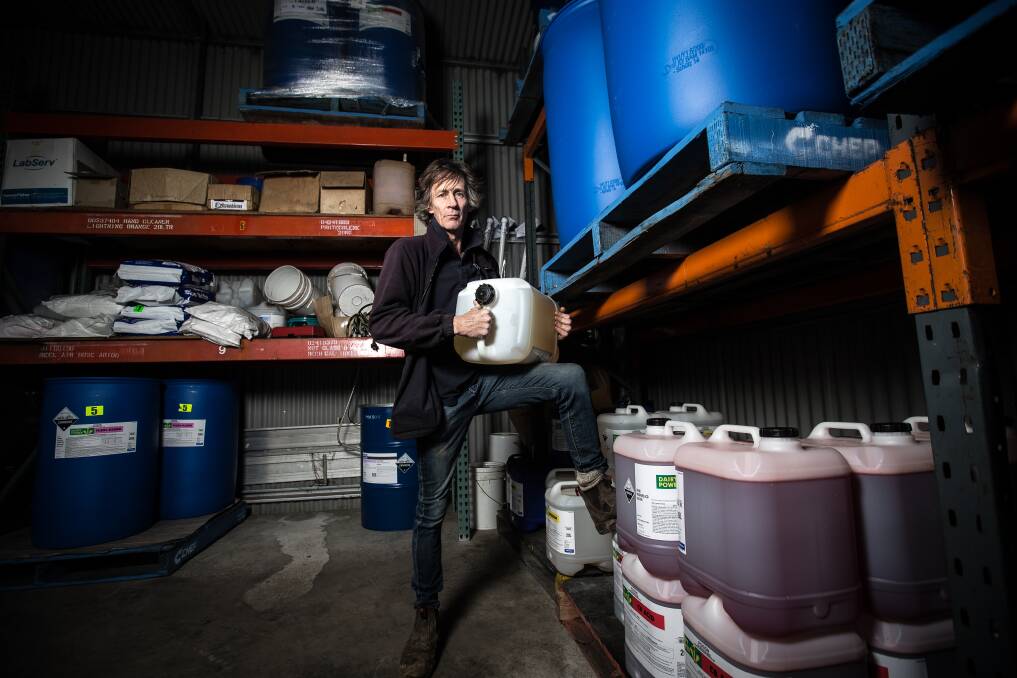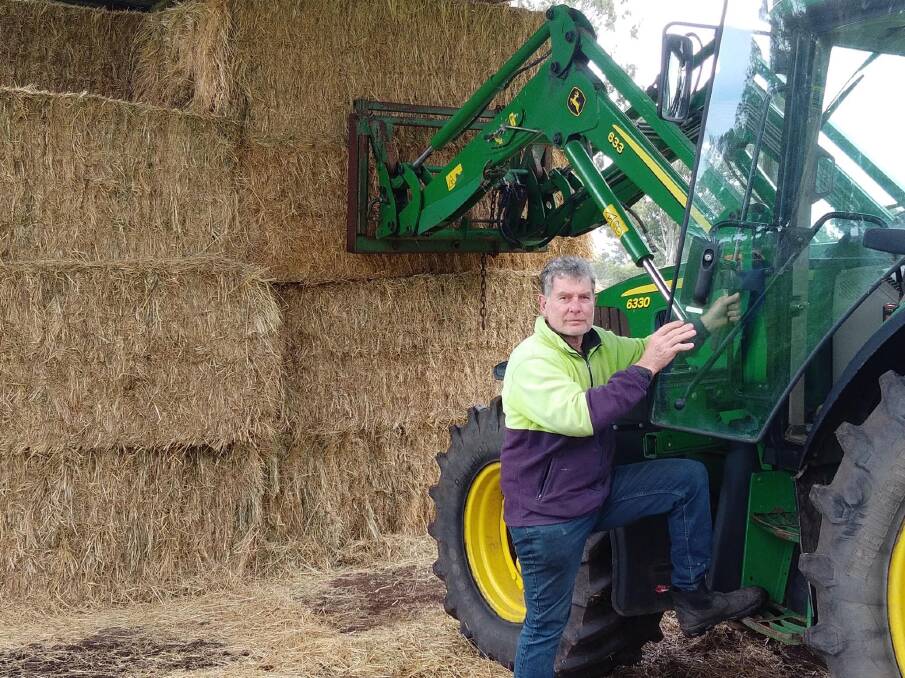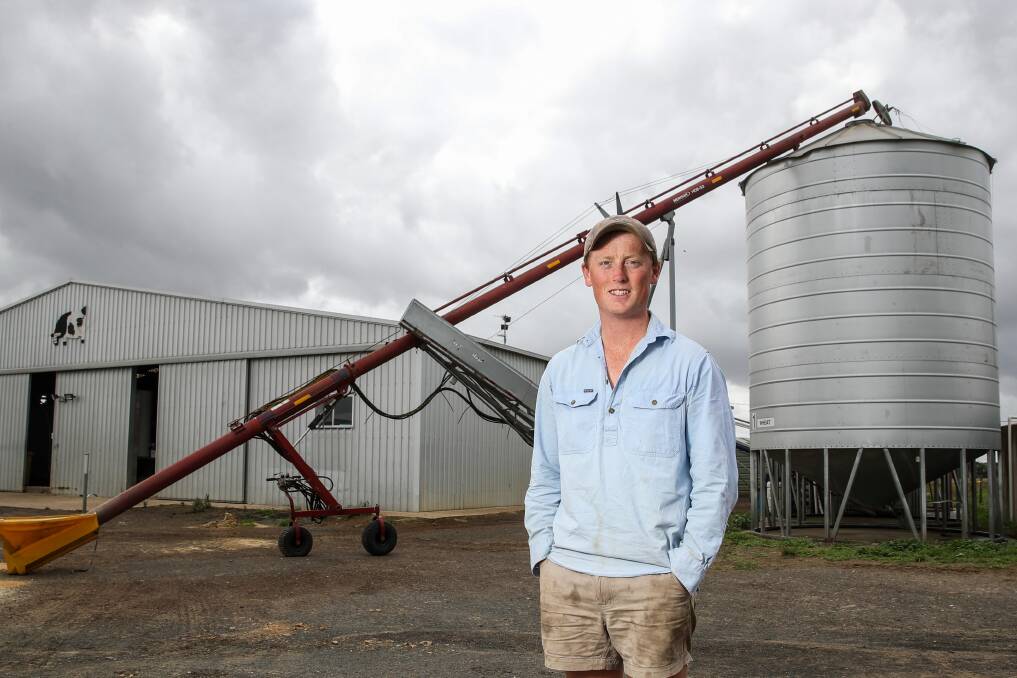
Generational farmers are under threat of being priced out of the south-west market as land prices surge.
Subscribe now for unlimited access.
or signup to continue reading
High input costs and a lack of workers are also making it harder for humble family farms to survive with a 'bigger is better' model seemingly the secret to sustainable businesses.
Where once smaller farmers could buy neighbouring land if it became available, they're increasingly cornered.
The closure of Camperdown Dairy due to inflationary pressures this month came as no surprise to Charles Dillon who'd seen the plight of south-west dairy farmers.
Mr Dillon regularly travels between Mount Gambier and Apollo Bay where he visits the 500 customers of his Naringal-based dairy supply business.
"It's an industry going through turmoil at the moment," he said.
"There's that many farmers who have got out, the milk prices are going to go up and up until it becomes unsustainable. You see the likes of the Camperdown factory fall because of it and that's all because of input costs.
"Dairies are getting shut down left, right and centre with really nice infrastructure, lane-ways, paddocks and good pastures. A lot of those cows with all those genetics are going to the abattoirs.
"We're talking generations of really good genetics wasted all because of pressures and because sheep farmers need the land and they're willing to pay for it."
Changing landscape
The region's temperate dairy zone has attracted a steady stream of farmers from marginal country who have battled rising irrigation costs.
That's partly caused the price of local land to rise dramatically across the past two decades.
Falk & Co director David Falk said the change in equity was stunning.
"From Warrnambool to Colac, land prices have gone up probably three-and-a-half times in the past 20 years," he said.
"When you go out more towards Mortlake, Lake Bolac, Hamilton and all through there, you used to be able to buy land out that way for $500 to $600 an acre and now it's $7000 to $8000 an acre."
Those prices may be eye-watering but Mr Dillon said "cashed-up" sheep farmers have willingly paid a premium.
"In the past six months I've lost 18 farms now to beef or sheep farmers because they're converting to beef or sheep," Mr Dillon said.
"Farmers are saying 'it's really not worth the stress, I'm over it and I'm just going to sell up while I can'. Then you have all these people buying here from up north because they think it's a bargain for $10,000 an acre because they've got grass all year around and they'll put some sheep on it."
Is bigger better?

Dartmoor cattle farmer Michael Greenham said rising land prices pushed farmers to change their operations.
"Through the '90s and the 2000s when drought commodity prices looked pretty dodgy, the mantra across all the agricultural industry was 'if you weren't getting bigger, you were going backwards'," he said.
"As prices dropped and costs went up, to stay profitable you either had to get bigger and produce more.
"For the general run-of-the-mill dairy you just had to get bigger as a way of spreading your cost out. You could put in a 50-cow rotary dairy for the same price as an 80 one so if you were going to upgrade your capital infrastructure.
"It made sense to go bigger rather than outlay a lot of money and get a very small return.
"There's still a pressure to expand but the cost of it now is massive."
Rich get richer
Mr Dillon said the stunted growth had prompted an inverse trend.
"There are farms that want to expand and buy their neighbour out but aren't because they just can't afford to," he said.
"It's a really stressful time and I can see people hunkering down instead and thinking 'I'll just concentrate on what I have at the moment and tread water'.
"There is the odd farmer who's still growing their business, but they're mainly ones with corporate backing.
"It's a rich get richer situation. If you've got the money, yes you'll make money because you can buy your neighbour out. You're less reliant on the banks and when the interest rates go up and the land prices drop back to six or seven grand an acre, they've got the money to back them.
"With interest rates, those farms who have bought their neighbours out are about to get bitten if the milk prices go down. There's a lot of uncertainty in the industry, there's all these little things which are muddying the waters.
"Expansion is just too risky with interest rates going up. There's quite a few who have said 'stuff this, I'll milk a few less cows and still make the same amount of money, pay off the debt and just hunker down'."
Back to basics
Mr Greenham said small to medium-sized farms including his own had two alternatives to remain profitable.
"The push is now not so much to increase land size but to be more productive with what you've got to improve your output," he said.
"There are other forms of utilising land like leasing it or share farming it that are becoming popular.
"It's also about choosing a specific, niche market and aiming your product at that. For example, I'm accredited to sell to the European Union and that's a specialised market with quality assurance to maintain that status.
"For others, it might mean using jersey milk for specialist cheeses or really high butter fat content."
New ideas

Hamish Wortley, 19, works on his family's 2000 acre dairy in Macarthur. As a new generation farmer he said he wanted to invest in new technology to maximise efficiency.
"The main thing is optimising your operating efficiency - how to get back as much as you can off what you have now," he said.
"We have collars on cows to track their rumination and their heats which has been a major step for us. We have GPS in the tractors so we're very accurately using our fertiliser - the navigation is accurate within two centimetres which ensures we don't overlap and overuse fertiliser where we don't have to. It's the same with spraying and using chemicals."
Our journalists work hard to provide local, up-to-date news to the community. This is how you can access our trusted content:
- Bookmark https://www.standard.net.au/
- Make sure you are signed up for our breaking and regular headlines and newsletters
- Follow us on Facebook, Twitter, Instagram and LinkedIn
- Tap here to open our Google News page.
- Join our Courts and Crime Facebook group and our dedicated Sport Facebook group
- Subscribe















